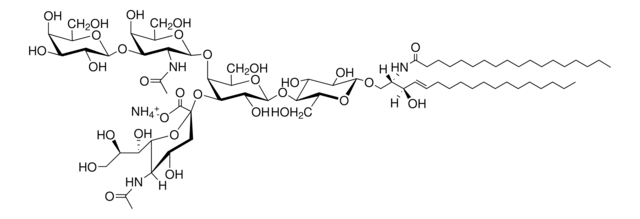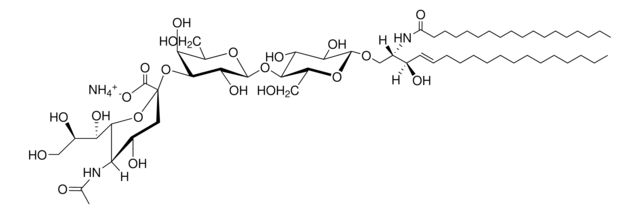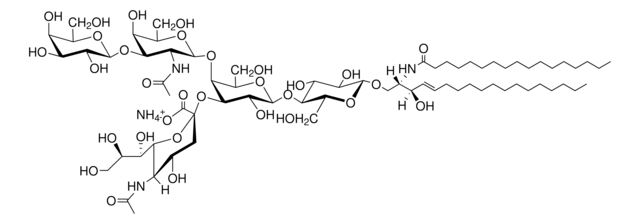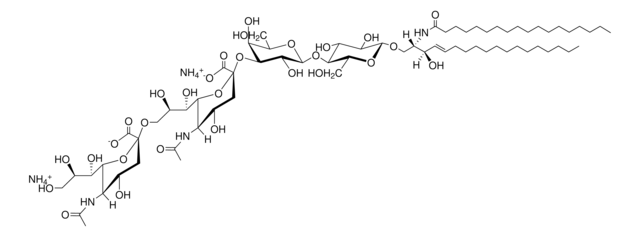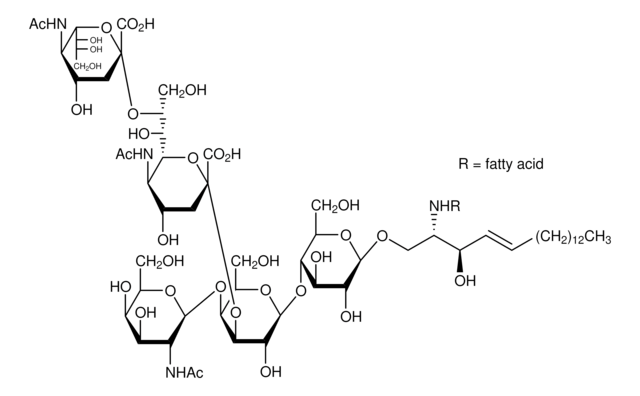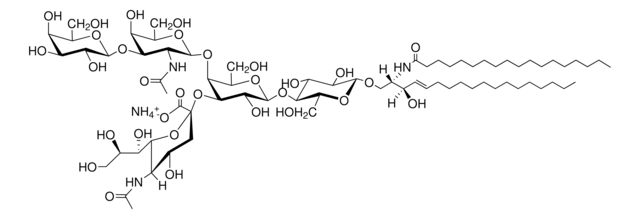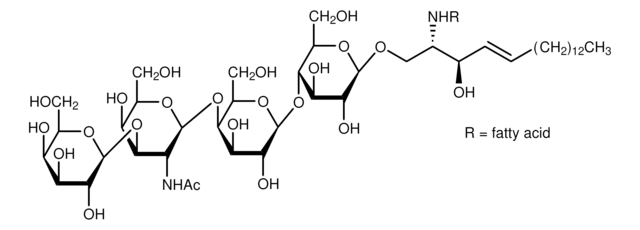G5642
Monosialoganglioside GM3 from canine blood
≥98%, lyophilized powder
Iniciar sesiónpara Ver la Fijación de precios por contrato y de la organización
About This Item
Productos recomendados
Quality Level
assay
≥98%
form
lyophilized powder
solubility
chloroform/methanol/water (9.5:9.5:1): 20 mg/mL, clear, colorless to light yellow
storage temp.
−20°C
¿Está buscando productos similares? Visita Guía de comparación de productos
Categorías relacionadas
General description
Gangliosides are major constituents of neuronal cell membranes and endoplasmic reticulum. They contain a sialated polysaccharide chain linked to ceramide through a β-glycosidic linkage. For classification of gangliosides see Svennerholm, L., et al. (eds.), Structure and Function of Gangliosides, New York, Plenum, 1980.
Application
Monosialoganglioside GM3 from canine blood has been used as a reference standard in high-performance thin-layer chromatography (HPTLC) to analyze ganglioside signatures of prostate cancer (CaP) cells. It has also been used to determine ganglioside-binding profiles of methylotrophic yeast (Pichia pastoris) secreted cholera toxin B subunit (PpCTB) by enzyme-linked immunosorbent assay (ELISA).
Biochem/physiol Actions
Monosialoganglioside GM3 has a potential role in cancer development and progression. Increased expression of GM3 has been observed in various types of cancer. Hence, it is used as a tumor-associated carbohydrate antigen during cancer vaccine development.
Monosialoganglioside-GM3 is the most common ganglioside and the major ganglioside in non-neuronal cell membranes. It inhibits epidermal cell growth and is involved in the biosynthesis and metabolism of all higher gangliosides.
Analysis Note
The product is soluble at 20 mg/mL in a 1:1 mixture of chloroform and ethanol with 5% water. The resulting solution is colorless
Storage Class
11 - Combustible Solids
wgk_germany
WGK 3
flash_point_f
Not applicable
flash_point_c
Not applicable
ppe
Eyeshields, Gloves, type N95 (US)
Elija entre una de las versiones más recientes:
¿Ya tiene este producto?
Encuentre la documentación para los productos que ha comprado recientemente en la Biblioteca de documentos.
Los clientes también vieron
Mepur H Ravindranath et al.
Biochemical and biophysical research communications, 324(1), 154-165 (2004-10-07)
Prior development of a unique androgen-receptor (AR)-negative cell line (HH870) from organ-confined (T2b) human prostate cancer (CaP) enabled comparison of the gangliosides associated with normal and neoplastic prostate epithelial cells, organ-confined versus metastatic (DU 145, PC-3), and AR-negative versus AR-positive
Annemieke de Jong et al.
Nature immunology, 15(2), 177-185 (2013-12-24)
T cells autoreactive to the antigen-presenting molecule CD1a are common in human blood and skin, but the search for natural autoantigens has been confounded by background T cell responses to CD1 proteins and self lipids. After capturing CD1a-lipid complexes, we
Contenido relacionado
Discover Bioactive Small Molecules for Lipid Signaling Research
Nuestro equipo de científicos tiene experiencia en todas las áreas de investigación: Ciencias de la vida, Ciencia de los materiales, Síntesis química, Cromatografía, Analítica y muchas otras.
Póngase en contacto con el Servicio técnico

